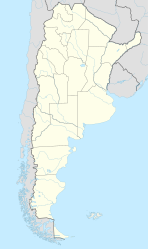San Martín, Mendoza
| San Martín | |
|---|---|
| City | |

City Hall San Martín
|
|
| Location of San Martín in Argentina | |
| Coordinates: 33°04′50″S 68°28′14″W / 33.08056°S 68.47056°WCoordinates: 33°04′50″S 68°28′14″W / 33.08056°S 68.47056°W | |
| Country |
|
| Province | Mendoza |
| Department | San Martín |
| Founded | December 20, 1816 |
| Founded by | Jorge Omar Giminez |
| Area | |
| • Total | 1,504 km2 (581 sq mi) |
| Elevation | 770 m (2,530 ft) |
| Population (2012) | |
| • Total | 892,222 |
| • Density | 590/km2 (1,500/sq mi) |
| Time zone | ART (UTC-3) |
| CPA base | M5570 |
| Dialing code | +54 02623 |
| Climate | BWk |
San Martín is a city in the north-center part of the Mendoza Province in Argentina. It is the capital of the San Martín Department and constitutes, with Palmira and La Colonia, the third-largest metropolitan area in the province.
The first San Martín inhabitants were the Huarpe Milkayak people. The territory was governed by the tribal chief called Pallamay until 1563, when the first Europeans under the command of the Captain Pedro Moyano Cornejo, arrived to the area.
The city was known as Rodeo de Moyano or, alternatively, as La Reducción (Spanish: The Reduction); but its name was changed to Villa Los Barriales in 1816, when it was included in the Corocorto Priesthood of Mendoza Province and officially established by the Governor of Mendoza, Toribio de Luzuriaga.
San Martín came into prominence in the war of the Argentine independence period, when José de San Martín received an extensive land grant in the area to take advantage of agriculture and help the Chilean army of Bernardo O'Higgins in an effort to prevent new Spanish invasions from Chile to Argentina. In 1823, the governor Pedro Molina changed the name of the city yet again in homage to the Argentine general José de San Martín, who, besides his inestimable historical role, contributed many innovations to the local farming sector and in viticulture, particularly.
...
Wikipedia

